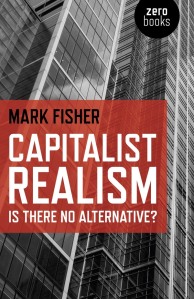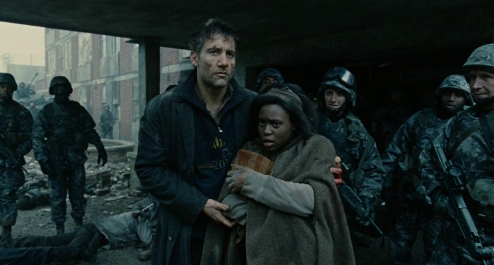One reoccurring charge against postmodernism and poststructuralism alike is that they are unable to think utopia.
At first  pass, this certainly seems plausible, after all postmodernism in Lyotard’s famous formulation was defined as “incredulity towards metanarratives.” For another example, in all of Derrida’s work on deconstruction, did he not (perhaps admirably) refuse to offer an alternative to logocentrism? To be sure, he privileged writing over speech and praised grammatology. But by and large Derrida resisted utopia’s allure. Plus, aren’t classic postmodern works like Naked Lunch, The Crying of Lot 49, or Blade Runner deeply pessimistic?
pass, this certainly seems plausible, after all postmodernism in Lyotard’s famous formulation was defined as “incredulity towards metanarratives.” For another example, in all of Derrida’s work on deconstruction, did he not (perhaps admirably) refuse to offer an alternative to logocentrism? To be sure, he privileged writing over speech and praised grammatology. But by and large Derrida resisted utopia’s allure. Plus, aren’t classic postmodern works like Naked Lunch, The Crying of Lot 49, or Blade Runner deeply pessimistic?
Indeed it is easy to paint that entire period of philosophy and art as the culmination of skepticism or cynical reason—or in other words as the withering of modernist utopianism or perhaps as nothing less than pure crystalized dystopia. As one of the characters in Woody Allen’s 1997 Deconstructing Harry, charged the protagonist
“You have no values. Your whole life, it’s nihilism, it’s cynicism, it’s sarcasm and orgasm.” To which he replied: “You know in France, I could run on that slogan and win.”
But of course, even in France he couldn’t. As it would seem at least a hundred political theorist have observed—it is hard to organize a politics around cynicism and nihilism, people need something to believe in and work toward, and hence the inability to think utopia is supposed to be precisely why postmodern and poststructuralist theory have failed to transform into easily recognizable political projects. As Žižek has argued, totalitarian regimes maintain their hold by encouraging cynicism. All they need to forestall revolution is to convince the masses that every politician is a bastard and all politic is corrupt. People think “why bother?” and they continue supporting, with ironic distance, the mechanisms of a state in which they no longer believe. The promotion of postmodern skepticism would therefore seem to disable politics and prevent its ability to mobilize against the exploitations of global capitalism.
This critique of utopias’ absence has been sharpened recently by the British philosopher and blogger Mark Fisher. Fisher’s Capitalist Realism. Is There No Alternative? (2009) was inspired by the insight (attributed to Slavoj Žižek and Frederic Jameson) that
“it is easier to imagine the end of the world than it is to imagine the end of capitalism.”
This too certainly seems plausible and if you’ll follow me over the fold, I’ll layout both Fisher’s case AND in the next blog-post I’ll argue against this thesis by looking at a few seeds of anti-capitalist utopia
Today, models of actual communism seem nearly non-existent, especially following the dissolution of the Soviet Union as well as China and Vietnam’s embrace of the global marketplace. After Clinton and Blaire, the British and American Left too seems to have dropped the resistance to global capital. Indeed in our current epoch, it is often claimed that Marxism was little more than a pipe-dream, that anti-capitalist socialism was misguided, and that Capitalism is the only “realistic” economic system. More specifically, Mark Fisher equates what he calls “capitalist realism” with “the widespread sense that not only is capitalism the only viable political and economic system, but also that it is now impossible even to imagine a coherent alternative to it.” (Fisher 2009, 2)
Paraphrased, Fisher’s main argument is that this capitalist realist aesthetic permeates not just politics and philosophy, but also Euro-American popular culture. Is this accurate?
Sure, as Žižek has repeatedly emphasized, the capitalist system does have avenues for the ritual performance of anti-capitalism. You can buy Che Guevara T-shirts at the mall, watch movies about evil corporations (e.g. Prometheus), or even bang your head to Rage Against the Machine tracks on your iPhone. But all these forms of resistance are actually built into the capitalist system itself. For the most part they require you to purchase something or they lull you into a passive state in which the actors on the screen perform your anti-capitalism for you. Restated, we symbolically ward off capitalism, by purchasing anti-capitalist entertainment. And as Žižek likes to point out, the few more active alternatives like protesting outside the McDonalds or taking college classes on Marxism, are merely temporary gestures designed to allow us to vent without really disturbing the equilibrium of the system.
But, as Fisher argues, despite our proliferating fantasies of possible futures and alternate worlds, even in fiction we are trapped within the limits of a specifically capitalist imaginary. We seem to have no problem picturing the end of the world—indeed dystopias and apocalypses abound in films and novels—but we seem to have given up on non-capitalist utopian fantasy and even when we present the end times it seems marked by the persistence of the commodity.
One of Fisher’s key examples is the 2006 film, Children of Men, which imagines a future in which nearly complete infertility has led to an apocalyptic world with no new children. Civilization is in decline and humanity seems to be getting ready to exit the stage. It is set in an England that seems to have suspended many of the functions of the state, from trash cleanup to public healthcare. But immigration services and the military live on. As does capitalism. So here we have a fantasy of the end, but one which still constrains itself to a single economic model. As though to say, no matter how bad things get, there will still be merchants there to sell you more bullets.
Children of Men isn’t unique. The global recession seems to have budged nothing. Film after film is set in some sense against the backdrop of Armageddon and also preserves a version of capitalism. For more contemporary examples, think of Elysium (2013) in which the earth is ruined, but rich people have their own luxurious and fully capitalist space habitat, at least until Matt Damon shows up. Or you might think of Snowpiercer (2013) (which Ok. I confess I haven’t seen), but from the trailers it looks like after a total environmental collapse rich people still have first class seats on the world’s last train or something. So it would seem some sort of capitalist economy is at least partially in place. Or one might think of the Hunger Games series, which seem to be all about exploring the disparities of a capitalist dystopia.
To be sure, there are dystopian films and novels that imagine society so far gone that even capitalism is no longer functional. Think of the numerous zombie films that make looting the primary order of the day. But Fisher’s point would be that these too fail to propose actual alternatives to capitalism, and as soon as they imagine society functioning again they often seem compelled to reintroduce currency-based commerce.
Utopia hasn’t fully vanished from science fiction. This alone should be some news to those who imagine that pessimism is the only order of the day. But Fisher would probably respond by noting that the rare post-1989 utopian film still tend to be situated in firmly capitalistic worlds. Perhaps one might argue that Gattaca (1997) was fairly utopian (although incompletely so) but it showed no departure from a capitalist system.
A better example for Fisher’s argument would be Spike Jonze’s Her (2013). For the uninitiated, the plot revolves around a future pedestrian Los Angeles that looks like Tokyo or Shanghai in which a sensitive greeting-card writer falls in love with his operating system (voiced by Scarlett Johansson in what is probably her best acting because she can’t rely on looking pretty and sullen). But not only is the aesthetic so heavily borrowed from Apple that it looks like a long advertisement for a future version of the IOS operating system (replace Samantha with Siri), but it also imagines a positively valenced capitalism as the undergirding system for this idealized future. Indeed insofar as it suggests a clean safe future, it seems to be arguing that it is capitalism, maybe even corporate capitalism that will get us there. Still I would definitely recommend the film to those who haven’t seen it.
All this is to say, it is easy to see how Fisher might be right. Indeed when I first posed the question to my Spring 2014 Theory After Postmodernism class, none of the students were initially able to come up with a non-capitalist utopia. They were well aware of various imagined apocalypses and it is true that some stuck up for capitalism’s utopian possibilities, but utopian alternatives to capitalism were not forthcoming.
But while I think Fisher’s argument is both insightful and telling, I held in reserve a utopia alternative because although only at the margins there has been a Stubborn Persistence of Post-Capitalist Utopia. But perhaps I’ll leave you hanging and ask you to wait for the next blog post in a couple of (days? weeks?) to read what it is.
EDIT: Until then you can check this post out Capitalist Dystopia Part 1–The Janus-face of Capitalism or Is Walmart Utopia?



Star Trek TNG is a possible post capitalist utopia surely? Quite old though. Wired had an article that was terribly written that did call for more promising visions of the future. Personally I think we’ll never have a stary-eyed vision back again. We will move away from cynicalism and I feel we are doing so through recent enough movements like New Sincerity and Metamodernism. The design academia has also partnered with Sci-Fi to churn out Design Fiction, which I think is beginning to play to into these advances.
Article: http://www.wired.com/2014/08/stop-writing-dystopian-sci-fiits-making-us-all-fear-technology/
In-Wired Reply: http://www.wired.com/2014/08/no-dystopian-sci-fi-isnt-bad-for-society-we-actually-need-it-more-than-ever/
Digimodernism by Alan Kirby (IIRC) is worth a look as well.
(Fucking wordpress)
Star Trek TNG is a possible post capitalist utopia surely? Quite old though. Wired had an article that was terribly written that did call for more promising visions of the future. Personally I think we’ll never have a stary-eyed vision back again. We will move away from cynicalism and I feel we are doing so through recent enough movements like New Sincerity and Metamodernism. The design academia has also partnered with Sci-Fi to churn out Design Fiction, which I think is beginning to play to into these advances.
Article: http://www.wired.com/2014/08/stop-writing-dystopian-sci-fiits-making-us-all-fear-technology/
In-Wired Reply: http://www.wired.com/2014/08/no-dystopian-sci-fi-isnt-bad-for-society-we-actually-need-it-more-than-ever/
Iain M. Banks’ novels about the Culture could be the example you are looking for.
See for example this theoretical article: http://www.sciencedirect.com/science/article/pii/S0160791X11000728
Or this blog version: http://yannickrumpala.wordpress.com/2010/01/14/anarchy_in_a_world_of_machines/
Sorry for a long wait in approving this. I’ve been away from the blog. But you are right. I have in mind Banks’ Culture (in part) for the Utopian post. It’ll be about another month before it goes up. Until then I have some dystopian thinking I want to get off my chest.
And thanks for the links. I’ll check those out.
Pingback: Dystopia Revisited (Blogging Unblocked) | Absolute Disruption: Theory after Postmodernism
Pingback: Capitalist Dystopia Part 2——-A Voyage to the Dark Heart of Capitalism or what can Joseph Conrad tell us about commodity fetishism? | Absolute Disruption: Theory after Postmodernism
Le Guin’s ‘Dispossessed’ comes to mind as a utopia but as Le Guin herself notes in the title, this utopia is quite ambiguous. Perhaps I’m too deeply socialized in capitalism but the world of Annares never really seemed like a utopia to me.
TNG seems like a post-capitalist utopia on the surface and definitely pays lip service to the idea that there is no more money on earth, yet money features prominently in several episodes and commodity fetishism is very much present in most of them.
Good suggestions, Vinod. I haven’t read “Dispossessed” (although her Earthsea trilogy was a formative influence on my childhood). So I’ll definitely check it out.
I think you are totally right about TNG and I’ll talk about it in a later post. Thanks!
Love love love this article! What do you think of Mr Robot?
Sorry for the delay! I just noticed this. I haven’t seen Mr Robot. Is it good?
Yes! it’s a great show. The best of 2015 if you ask me. And it has a lot to do with your article!
Thanks for the recommendation. I’ll definitely check it out!
Pingback: The future of work | V. Araujo @ LUT
Pingback: Hack the Metaverse: A Metamodernista’s Take on Facebook’s Rebranding | Absolute Disruption: Theory after Postmodernism